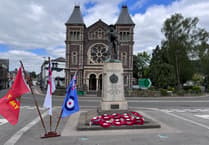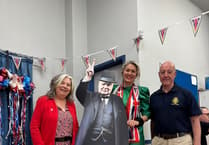Frank Brehany is a media contributor and activist living close to Monmouth and is due to launch his new book.
A Magdelene Rose tells the story of a mother who was incarcerated without due process for 42 years, a father who suffered loss and isolation, their son and the secrets his wife carries with her.
“I had been researching the topic since 2010,” the local author said.
“Finally, by the time lockdown came, I decided to sit down and put this story together with no distractions.”
Frank grew up as a part of the Irish community in Birmingham and became drawn to the injustices when studying for his degree.
But he says his knowledge of the system here in the UK has grown since researching and writing his latest work.
“I hadn’t any knowledge of the mother and baby homes and laundry system here in the UK. That was when I began to learn about the 23 mother and baby homes in South Wales.”
“There is a great deal of connectivity and synergy between what happened here and what happened in Ireland.”
Frank recounts meeting many of the second generationers at the Irish Centre in London who spoke of missing family members and unspoken events.
“There is not a family in Ireland who isn’t affected by this, I know people in France and across the UK who have very similar experiences.”
“I can put my money on the table and say for myself that it will be the same for people here in South Wales.”
Women were always stripped of their children, and the vast majority of the time this would have been a permanent separation. People suffered many different aspects of suffering, with records of women being blinded by chemicals and children forced to kneel and beg forgiveness to be let out of holding cells.
There are many people who have suffered in later life as a result of their treatment as well.
“My own dad couldn’t read or write when he came to this country and many people like him struggled personally with the trauma of what they had experienced,” Frank says.
The author says he wants his work to act as a form of justice for those who endured such treatment.
“This is and will be a permanent record of what happened to poor people in Ireland, particularly my dad, my grandfather and grandmother.”
“The UK still does not recognise all the victims of mother and baby homes, and there is great connectivity. Many Irish people are following the Welsh story, and as disgusted as they are with their own experiences, they’re disgusted for the people here as well.”
Frank Launches his book on Saturday May 17th at Monmouth Library, Whitecross Street, between 10:30am and 11:45am with a chance to meet the author and a Q and A session.





Comments
This article has no comments yet. Be the first to leave a comment.